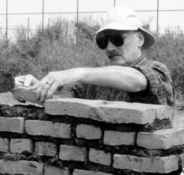
|
||
|
|
|
FALL, 2000:
Volume 5 Issue 3 Leading or Being Led? by Ray Boucher In May of 1999 my wife arrived home from a Peace & Social Concerns meeting with a pamphlet that described a project called Kamenge Reconstruction and Reconciliation Project. It reviewed the historical background that led to major conflict and violence in Burundi, Africa, and summarized the purpose of this undertaking. It also provided information about applying to participate as a member of the Team. My heart quickened. I envisioned myself being a Team member. I became excited. I read the application requirements. One thing in my favor was that possession of good skills in building was not a prerequisite. The deadline for filing was one day away. No Problem. I obtained the application and returned it by e-mail. Uh, Oh! It says the applicant should have a Clearness/Support Committee. Sounds reasonable. Whatever it is, I�ll get one. Once my application was in process and my acceptance confirmed, I never doubted my decision. After filing my application, I called six people from Hartford Monthly Meeting whom I had met through my wife�s involvement with the Peace and Social Concerns Committee. All six accepted at once to be on the Committee. No coaxing. No call backs. Just �yes!� My wife also joined the Committee. I was very moved by such a response. I thought �Quakers do it, they don�t just talk about it.� That was the beginning of my pull to Quakers. Was I leading or being led? I wanted
my Clearness Committee to know that I was doing this for me. I was drawn
by the opportunity to go to a far away place; to experience first hand
the hardship of the lives of the people who live there. I was pleased
that as a member of the Team, I might be an agent offering hope and
connection to people who are oppressed and isolated. Was I leading or
being led?
I wanted my Clearness Committee to know that I was concerned about how little I brought to the table, i.e., not familiar with Quaker practice, a lack of technical skills in building and little experience in �roughing it�. I envisioned being in some remote place having to eat strange food, while fighting off malaria-carrying mosquitoes and watching for any sign of warlike activity. �How will I handle it?� was my concern, not �maybe I shouldn�t be doing this.� Was I leading or being led? Probably both. I took the lead and my Clearness Committee picked up the lead. It was like cross-pollination where we all benefited from our involvement. I knew that I had everyone�s encouragement and support, which continually moved me forward. I don�t usually see myself as very spiritual but a spirit surrounded me from these meetings and from discussions with this peer Committee. I felt a responsibility develop to live up to the expectations and beliefs that they had in my contributions to the Team and the project. Was this leading or being led? One of the most rewarding pieces for me has been the continuity of the relationship with the Committee. After my return from Burundi, my Committee initiated debriefing meetings and helped me with the emotional baggage with which I returned. This was very valuable. In turn, I used my Committee to support me in doing outreach. Without them, I probably would have let the experience fade and then moved on to something else. This same Committee, every person, agreed to continue to provide clarity and support for my subsequent participation in a Friends Peace Team Project in Uganda; beforehand, during the project and after my return. We met as recently as two weeks ago to review our ongoing efforts and to be updated on current conditions in the involved countries. The Committee will remain intact indefinitely as we look at ways that our Monthly Meeting and New England Yearly Meeting might further build our relationship with Burundi Yearly meeting and other African Quakers. TOP
• CURRENT Issue Index • PTN
Index • HOME |
